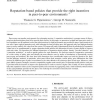Free Online Productivity Tools
i2Speak
i2Symbol
i2OCR
iTex2Img
iWeb2Print
iWeb2Shot
i2Type
iPdf2Split
iPdf2Merge
i2Bopomofo
i2Arabic
i2Style
i2Image
i2PDF
iLatex2Rtf
Sci2ools
CN
2006
2006
Reputation-based policies that provide the right incentives in peer-to-peer environments
Peer-to-peer are popular environments for exchanging services. A reputation mechanism is a proper means of discovering low-performing peers that fail to provide their services. In this paper, we present an in-depth and innovative study of how reputation can be exploited so that the right incentives for high performance are provided to peers. Such incentives do not arise if peers exploit reputation only when selecting the best providing peer; this approach may lead high-performing peers to receive unfairly low value from the system. We argue and justify experimentally that the calculation of reputation values has to be complemented by proper reputation-based policies that determine the pairs of peers eligible to interact with each other. We introduce two different dimensions of reputation-based policies, namely ``provider selection'' and ``contention resolution'', as well as specific policies for each dimension. We perform extensive comparative assessment of a wide ...
| Added | 11 Dec 2010 |
| Updated | 11 Dec 2010 |
| Type | Journal |
| Year | 2006 |
| Where | CN |
| Authors | Thanasis G. Papaioannou, George D. Stamoulis |
Comments (0)

